Currently reading
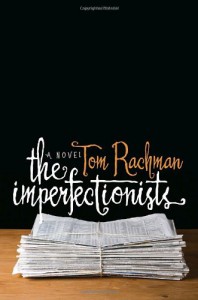
A collection of short stories, The Imperfectionists tells the stories of the men and women working for a struggling international English language newspaper in Rome. While the stories themselves are those of the contemporary employees ranging from the Editor in Chief to the obituary writer and accounts payable, the in-between moments are woven through with vignettes depicting the newspaper's history.
I was rather surprised by this collection. The author set out to write a character driven book, and he accomplished it. I appreciate that he did not go out of his way to make these men and women likable. Which is not to say they aren't, it is just very clear that his intent was to give the reader an inside look at real people, their insecurities, flaws, and imperfections. Too often authors fall into the trap of making their characters too black or white, either all good or all bad, resulting in a caricature of human nature. Rachman does not do that, and we instead wind up with a realistic glimpse into the lives of people who are no different than you or me.
While the story does advance to a definite conclusion, this book is not for the readef who needs their books to be plot driven. It is all about the people who reside in its pages. I also don't think it is for anyone who does not enjoy short stories. Once upon a time, I thought that was me. I have since realized that I was wrong. A short story done well can be every bit as enjoyable and complete as a novel. This collection does a fine job at doing exactly that. If you enjoy short stories and character portraits, then I would recommend you give this book a look.
The Sixth Extinction
 Responding to an urgent distress call from a remote research sstation in Utah, Painter Crowe and the rest Sigma Force are once again on a mission to save the world. This time they are facing a kidnapped scientist who studies extremeophiles and synthetic biology, a rogue environmentalist, and a para-military group who hunts them all the way to Antarctica. Assisting them is intrepid Park Ranger Jenna Beck and her husky, Niko.
Responding to an urgent distress call from a remote research sstation in Utah, Painter Crowe and the rest Sigma Force are once again on a mission to save the world. This time they are facing a kidnapped scientist who studies extremeophiles and synthetic biology, a rogue environmentalist, and a para-military group who hunts them all the way to Antarctica. Assisting them is intrepid Park Ranger Jenna Beck and her husky, Niko. As always, this story is utterly improbable, though it is firmly rooted in real science and history, with information for further research provided in the author's note. While I said when I read the eighth book in the Sigma Force that the format was getting a little tired, I enjoyed this one a bit more. The science really intrigued me, and I will definitely be reading more on those topics. A couple of Sigma Force's team members were either entirely absent, or only peripherally involved, with the introduction of a new computer scientist, Jason Carter (who was actually introduced first in Rollins first novel Subterranean, which is not part of the series) taking their place.
I opted to listen to this one on audio, and wish I hadn't for two reasons. The narrator Christian Baskous was not at all enjoyable to listen to. I didnt like his pacing, how he interjectec emotion, or the voices he gave to any of the characters, especially women and the many Brits. Further, it made it painfully obvious to me that while I enjoy these books for what they are, exciting thrillers, Mr. Rollins is not a highly skilled writer. He does a lot of telling not showing, and some of his phrasing and descriptions are truly cringe-worthy. I have never really noticed it before, so I think it was just brought to my attention because I was listening to this book. In the future, I will stick to the printed word.
Rollins recently released the 11th installment in the Sigma Force series, Bone Labirynth, which I look forward to reading soon.
Maus, Vol. 2: And Here My Troubles Began
 Continuing where the first book left off, Maus II depicts, Vladek's time in Auschwitz and his life immediately following the war as he searched for his wife, Annja, and home. In creasingly, Art and Vladek's current life is shared in the panels, which shows not only the Holocaust forever changed Vladek, but also the guilt that Art experiences, along with their rocky relationship.
Continuing where the first book left off, Maus II depicts, Vladek's time in Auschwitz and his life immediately following the war as he searched for his wife, Annja, and home. In creasingly, Art and Vladek's current life is shared in the panels, which shows not only the Holocaust forever changed Vladek, but also the guilt that Art experiences, along with their rocky relationship. Every bit as good as the first book, I really do think these books should be read together. Seperately they only give you part of the story, which I think dilutes it. Together they are a powerful and moving testement to atrocities committed, and a reminder that never again should we allow a group of people to so systemically set out to destroy another.
Maus I : A Survivor's Tale : My Father Bleeds History
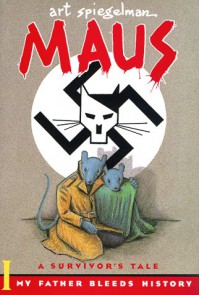 Determined that his father's experiences during the Holocaust not be forgotten, comic artist Art Spiegelman, recorded his dad's history. Maus I tells the story of his father's early adulthood in Poland, as a successful textile factory owner, until he was transported to Auschwitz.
Determined that his father's experiences during the Holocaust not be forgotten, comic artist Art Spiegelman, recorded his dad's history. Maus I tells the story of his father's early adulthood in Poland, as a successful textile factory owner, until he was transported to Auschwitz. Choosing to write this story in comic form was risky, and yet it is that risk that makes it so appealling. It is a new way of sharing the horror of this time, and through the drawings we are able to physically see the fear and bleakness of the ghettos and internment camps. It also reaches those readers who are more likely to pick up a comic book than a history book. It would be a great way to expose high school students to the Holocaust as well, and I hope to see it used in my sons' classrooms.
The Sparrow
 The Sparrow by Mary Doria Russell
The Sparrow by Mary Doria Russell5 Stars and Favorite
Angry at God and the world, sufferring from extreme survivor's guilt and an agony of the soul, Father Emilio Sandoza is the only surviving member of an interplanetary mission to a newly discovered world. When his friend Jimmy discovers radio transmissions, Sandoza marshalls the support of his order and in short order finds himself along with Jimmy and six others, half of them Jesuit priests, aboard a modified asteroid in search of alien life.
Put that way, this book sounds not only bizarre, but downright improbable. Not one author in a million could have pulled off this premise. And yet, Russell does so masterfully. Normally, even in the best of books,I can find something to criticize. That is not the case with The Sparrow. Every word was perfection. I loved getting to know these characters, their pains and their joys I felt deeply. I know this is not a book I will soon forget.
I have heard some say they were not happy with the ending and that they needed the sequel, Children of God, to put it to rights. I disagree. Like the rest of the book, I found the ending flawless. That said, I will definitely be reading the sequel very soon, along with the two remaining Russell books which I have not yet read.
One Summer: America, 1927
 With a focus of the events of the summer of 1927, Bryson provides the reader with an introduction to the historical events that shaped the 1920s. All the major players are here; Babe Ruth, Lou Gehrig, Charles Lindbergh, Henry Ford, Sacco and Vanzetti, Al Capone, Calvin Coolidge, and Herbert Hoover. Thrown into the mix were lesser known names, like Jack Dempsey the prize fighter, Andrew Kehoe who perpetrated what is still the deadliest attack on a school in U.S. history, Harry Laughlin the Superintendent of the Eugenics Record Office, and the railroad barons the Van Sweringen brothers.
With a focus of the events of the summer of 1927, Bryson provides the reader with an introduction to the historical events that shaped the 1920s. All the major players are here; Babe Ruth, Lou Gehrig, Charles Lindbergh, Henry Ford, Sacco and Vanzetti, Al Capone, Calvin Coolidge, and Herbert Hoover. Thrown into the mix were lesser known names, like Jack Dempsey the prize fighter, Andrew Kehoe who perpetrated what is still the deadliest attack on a school in U.S. history, Harry Laughlin the Superintendent of the Eugenics Record Office, and the railroad barons the Van Sweringen brothers.As a lover of history, I was really thinking that this might be the Bryson for me. I was wrong. Bryson spent 50% of the book focused entirely on Lindbergh. The reader was treated to minute by minute updates on the tedium of his US tour following his historic trans-Atlantic flight. If I wanted to read a biography of Lindbergh, I could hardly have selected a better book. Of the remaining 50%, about half that was spent on Babe Ruth with the remaining 25% indiscriminately and randomly tossed facts at you about a large host of people. Even the epilogue was mostly concerned with Lindbergh. Here we get an in depth look at his post 1927 life while each of the remaining subjects gets about two to three rapid fire sentences.
It was this lack of balance that ultimately dragged this book down for me. It is obviously very well researched, and I liked the month by month format, but the book really needed a more even handed approach to make it work. I have to wonder if this book even made it to an editor, because surely a good editor would have seen and fixed this glaring problem.
I was, however, thankful for the lack of what Bryson calls humor, as I find him not funny in the slightest. After two books by Bryson, both of which only received 2 stars from me, it is clear that he is not my cup of tea. That said he picks such interesting topics, and I have at least two other books by him on my to be read list. Perhaps I should remove them, but sadly I imagine I will end up reading and not liking those as well.
Gone Girl: A Novel
 When Nick Dunne's wife Amy goes missing on what would have been their fifth wedding anniversary, he is worried and scared, immediately calling the police. But no one besides his twin sister seems able to see that. In fact all evidence seems to point increasingly towards his being the culprit.
When Nick Dunne's wife Amy goes missing on what would have been their fifth wedding anniversary, he is worried and scared, immediately calling the police. But no one besides his twin sister seems able to see that. In fact all evidence seems to point increasingly towards his being the culprit. Told in alternating chapters, the reader learns the story of a troubled marriage directly from both Nick and Amy. At first, they see like a typical couple whose marriage is in decline following drastic changes to their lives. Both lost their jobs, they left New York City for Carthage, Missouri to care for Nick's ailing parents, and Amy's enormous trust fund has been decimated.
I somehow managed to go into this book with my eyes completely shut. I had heard that the characters were unlikable and that there is a big plot twist, but otherwise I knew nothing. I am glad I didn't because this is the type of story that requires the elemen t of surprise. That said, I guessed the plot twist before it's reveal. However, it was artfully done, and while at first I didn't get the hype regarding the unlikable of these two characters, it soon became very clear. These are two people who definitely deserved both each other and the outcome.
While the story was skillfully told, I just couldn't rate the book any higher than 3.5 stars. This is not through any fault of the author, but because this is a genre I don't typically care for. This is a very good example of a psychological thriller, and if that sort of stuff is your thing, then you will probably love this book. It isn't mine, so while I can recognize it's good qalities, it just didn't do much for me.
The Ghost at the Table
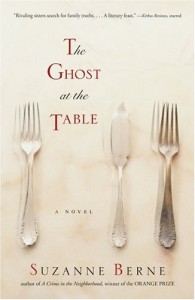 Cynthia Fiske loathes going home, though in actuality home means her sister's house in Concord and not the house in Hartford where she grew up. So when her sister Frances invites her back east to enjoy Thanksgiving with the family, Cynthia has misgivings; misgivings that only grow when she learns that their estranged father will be there as well. It becomes clear right away that not all is exactly what it seems, but Frances is determined to keep up appearances and Cynthia tries to be accomodating. But as they say, the road to hell is paved with good intentions.
Cynthia Fiske loathes going home, though in actuality home means her sister's house in Concord and not the house in Hartford where she grew up. So when her sister Frances invites her back east to enjoy Thanksgiving with the family, Cynthia has misgivings; misgivings that only grow when she learns that their estranged father will be there as well. It becomes clear right away that not all is exactly what it seems, but Frances is determined to keep up appearances and Cynthia tries to be accomodating. But as they say, the road to hell is paved with good intentions.This book is more than it appears. I thought when I started this book, that it was going to be easy-going women's fiction about family ties. And most of the way through the book, I continued to believe this. However as the conclusion approached, this novel became something more and all the subtle hints that I hadn't originally noticed as being important began to build upon each other to create a psychological drama about the nature of memory and truth. I am really impressed at how Berne pulled it altogether, making the reader question just who was deceiving themself and in which story the truth was really found. It has kept me thinking long since I turned the last page. Those who think this is just another simple example of women's fiction that can be ignored would be wrong, for it exhibits much of the best qualities found in that genre.
The Hand That First Held Mine
 In her usual arresting style, O'Farrell tells the reader two intertwined stories. The first is the story of a young woman living in postwar London, and the second a contemporary man and woman embarking on parenthood. It is not made clear until nearly two-thirds of the way through the book exactly how the stories are connected, though I begin to suspect long before. However it wasn't exactly what I expected and I I was grateful for that surprise.
In her usual arresting style, O'Farrell tells the reader two intertwined stories. The first is the story of a young woman living in postwar London, and the second a contemporary man and woman embarking on parenthood. It is not made clear until nearly two-thirds of the way through the book exactly how the stories are connected, though I begin to suspect long before. However it wasn't exactly what I expected and I I was grateful for that surprise. Since my first book by this author I have loved her style. From page one she hooks me and I have a hard time putting the book down. Telling two stories is often difficult, but O'Farrell does so regularly, and as usual handled it well. I was slightly more intrigued in the first, but the other story had no problem keeping me interested. In all, it was another great book by someone who is definitely one of my favorite contemporary authors.
 1
1
Lolita
 Awaiting trial, Humbert Humbert is encouraged to write his memoirs. In his account we learn about how the defining moment of his adolesence would haunt him into adulthood. This youthful interaction created in him a hunger for prepubescent girls of a certain age. When he encounters the young Dolores Hayes at the boarding house where he lives he becomes obsessed with her; eventually acting on this obsession is what leads him down the path that landed him in state custody.
Awaiting trial, Humbert Humbert is encouraged to write his memoirs. In his account we learn about how the defining moment of his adolesence would haunt him into adulthood. This youthful interaction created in him a hunger for prepubescent girls of a certain age. When he encounters the young Dolores Hayes at the boarding house where he lives he becomes obsessed with her; eventually acting on this obsession is what leads him down the path that landed him in state custody.This book is disturbing on so many levels I am not even sure where to start. HH's pedophilic desires, his obssesion, even Dolores herself. Yet I couldn't put this book down. It haunted me. Nabokov has created a truly fascinating character and Jeremy Iron's reading of the novel is unforgettable. I am not sure I will ever get his characterization of H.H. out of my head. His refined voice and mannerisms absolutely captured the very essence of this character. As for Nabokov, it absolutely blows my mind that he was able to take a character as vile as Humbert Humbert and make him sympathetic. His obsession with his Lolita nearly drove him mad and I could not resist the temptation to feel pity for this man, despite my disgust. I had to understand what drove him to the very depths of depravity.
I hesitate to recommend this book, because it's content and subject matter are truly repellent. Yet I also hesitate to say that any person can truly count themselves as well read without having read this book. That sounds elitest and snobhish, but Lolita is truly must read literature.
 1
1
Unaccustomed Earth
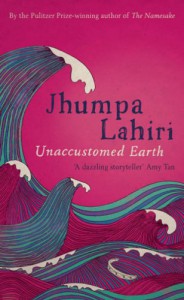 In this collection of short stories, the author parts the veil, allowing the reader a glimpse into the lives of the families whose stories she tells. The first five stories each focus on a different person, while the final three are snapshots from different portions of one life as told by two people.
In this collection of short stories, the author parts the veil, allowing the reader a glimpse into the lives of the families whose stories she tells. The first five stories each focus on a different person, while the final three are snapshots from different portions of one life as told by two people. The thread that seems to connect them eight is a sense of loss both in home but sometimes in death, a marriage falling apart, a relationship disintegrating. The loss of place, a knowing where your feet belong in this world is the more subtle, but more powerful element of the two. All of the characters have at some point left behind their Indian roots for a more prosperous life in the United States, yet they always remain off-balance, as do their children who can never be either Indian or American. I really appreciated how the author handled this aspect of her stories. As I read I never lost that sense of being off-kilter. The author's ability to maintain this balancing act throughout the entire collection was singularly impressive.
I was equally impressed with the gentleness of the stories. The author painted a moving portrait of the everyday and greater loses we all exprince daily, yet she was never heavy-handed or maudlin about it. It is in this that I was surprisingly reminded of Virginia Woolf's To the Lighthouse, though the two books couldn't be more different stylistically.
Like most short story collections I was left wanting more. However, it is that desire for more that will certainly drive me to read more by Lahiri. I think this is a very good example of a short story colection, that even those who do not typically enjoy the format would like.
Handmade Home: Simple Ways to Repurpose Old Materials into New Family Treasures
 I have loved Amanda Blake Soule's personable and friendly style since I first discovered her blog Soule Mama. It was through her that I rekindled my interest in the everyday act of creation. In my younger days I was a writer and muscian more than anything, while now it is the act of knitting to which I most often turn.
I have loved Amanda Blake Soule's personable and friendly style since I first discovered her blog Soule Mama. It was through her that I rekindled my interest in the everyday act of creation. In my younger days I was a writer and muscian more than anything, while now it is the act of knitting to which I most often turn. So when I saw this book at my friend's home and she offered to lend it to me, I was quite excited. Unfortunately, while still written in the style I love, most of them handmade items for which she provides directions are either things I no longer need such as baby slings or I cannot envision them in my home. The rag rug is the single exception, as I would love to have one to keep in my kitchen at the sink. I have come to realize it is not so much what she creates that I love as much as how she talks about what she is making, and also about her home that draws me to her. In the future I think I will stick to the blog. Though the book didn't appeal to me I would not hesitate to recommend it to the right person, and I know many of just the sort of person to whom this book would have great appeal.
The Palace of Illusions
 3.5 Stars
3.5 StarsI have read a lot of mythology. I know the stories of the Celtic tribes, the Germanic people who would conquer them, the Romans l the Greeks, and even of many of the nation's who inhabited North America. I am less familiar with the mythologies of the East, particularly India. Perhaps it was my love of mythology and that gap in my knowledge that drew me to this book. Regardless, when I selected it all I knew was the name Princess Panchaali and had a vague notion that the Mahabharat was an ancient Indian tale.
At the center of the story has always been the five Pandava brothers, cheated out of their kingdom. Yet this book turns the story on its head, instead of focusing on the brothers, author Divakaruni instead tells the tale through the mouth of the woman who stood by their sides, married to each at once as was ordained, the Princess Panchaali. Born of fire out a father's desire for revenge, she was the unexpected, and unwanted, child who followed her brother into the world. It was foretold that she would change the world. Gripped by her fate she guided and goaded her husbands into a civil war that would destroy thousands.
I enjoyed this book, though I didn't love it. Panchaali is a fascinating woman, flawed and ruled by her emotions. Told as it was in the first person the reader really learns to cone t with her, but all of the others seemed almost actors in her play. Well almost all of them. Like Panchaali, I came to love Krishna and eagerly looked forward to his next appearance in the story. I think this is a fascinating story that I want to read more about. The author is capable and one I believe I will search out in the future.
The Moonstone
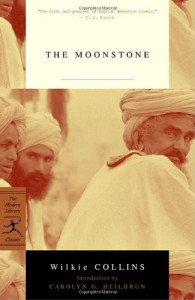 I did not finish this book. I have had it from the library for 10 weeks and have tried both the print and audio version. The story moves really slowly and is told from various points of view several years after the events. The plot itself revolves around the theft of a famous and cursed diamond after it is given as a gift to a young woman and the resulting attempts to solve the crime. Despite being halfway through the book, I just can't fathom continuing.
I did not finish this book. I have had it from the library for 10 weeks and have tried both the print and audio version. The story moves really slowly and is told from various points of view several years after the events. The plot itself revolves around the theft of a famous and cursed diamond after it is given as a gift to a young woman and the resulting attempts to solve the crime. Despite being halfway through the book, I just can't fathom continuing. I gave it two stars only because it was groundbreaking at the time it was written, as it is considered to be the first English language detective novel. Collins is often said to be Dickens' underappreciated contemporary and many consider him to be the better author, but in my estimation I would rather be only allowed to read Great Expectations for the rest of my life then read another book by Collins.
 1
1
The Nature Principle: Human Restoration and the End of Nature-Deficit Disorder
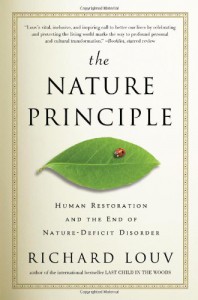 Following up Last Child in the Woods, Richard Louv has written a book for those of us who have grown up and remember what it was like to freely roam outdoors, unsupervised, until the street lamps came on. Somehow in the decades since our own childhoods we seem to have forgotten how important a connection to nature is. Using a basis of solid research, Louv shows exactly why we still need this connection. He breaks down the studies, augments them with personal experience, and describes exactly how nature can aid us physically, emotionally, psychologically, socially, and even economically. At my reading the book is already a few years old, so some of the research may already be outdated, but the message is still an important one. Now excuse me while I go for a walk in the woods.
Following up Last Child in the Woods, Richard Louv has written a book for those of us who have grown up and remember what it was like to freely roam outdoors, unsupervised, until the street lamps came on. Somehow in the decades since our own childhoods we seem to have forgotten how important a connection to nature is. Using a basis of solid research, Louv shows exactly why we still need this connection. He breaks down the studies, augments them with personal experience, and describes exactly how nature can aid us physically, emotionally, psychologically, socially, and even economically. At my reading the book is already a few years old, so some of the research may already be outdated, but the message is still an important one. Now excuse me while I go for a walk in the woods.
Life and Other Near-Death Experiences
 Poor Libby. She thought life was going great. A husband who loves her, a high paying job, and a close knit family. Sure it's not everything she hoped for, no kids and a mom who died of cancer when Libby was only 10, but she has a sunny outlook in life and that will get her through anything. Or so she thought. Then Libby is hit with two double whammies and she decides to flee Chicago for the sunny beaches of Vieques, leaving her life behind.
Poor Libby. She thought life was going great. A husband who loves her, a high paying job, and a close knit family. Sure it's not everything she hoped for, no kids and a mom who died of cancer when Libby was only 10, but she has a sunny outlook in life and that will get her through anything. Or so she thought. Then Libby is hit with two double whammies and she decides to flee Chicago for the sunny beaches of Vieques, leaving her life behind.I purchased this book as my Amazon Firsts selection a couple months ago. This book was so filled with cliches and Pollyanna attitude that I should have hated it, yet I didnt. I thought it was a good, not great, example of chick lit. The writing was decent, I enjoyed some of the characters - particularly Libby's Puerto Rican landlady Milagros, and it was quite apparent that the author knows and loves Vieques. After reading this book , I now have my first ever desire to visit a Caribbean Island ; bonus points that it is part of Puerto Rico and thus doesn't require a passport. If you are a fan of the genre, you would probably enjoy this book, but it's not going to be winning any awards, nor will I be telling anyone to run right out and buy it.








